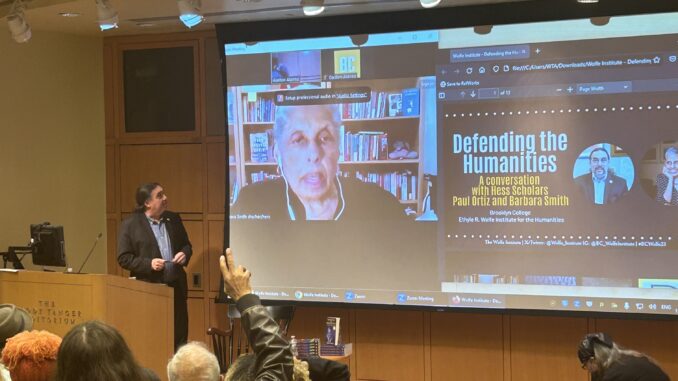
By Reima Choute
In a discussion about the current political attacks on the humanities and strategies to defend them, Brooklyn College’s Woody Tanger Auditorium hosted Hess Scholars Paul Ortiz and Barbara Smith on Thursday, Nov. 30. The event, titled “Defending the Humanities,” drew an overflow of a crowd, with students packing the auditorium and some even finding themselves perched on stairs and standing due to the overwhelming turnout.
Smith, attending via Zoom, expressed her delight at the enthusiastic reception and her eagerness to share knowledge with the Brooklyn College community once again.
“I think the major thing is for us to be well-informed […] having a wide view discussion of the humanities and how they function. I really feel that community mobilization is really, really important in figuring out what we can do with the resources that we have,” Smith said, advocating for a collective approach to address challenges within the field and emphasizing the need for a comprehensive understanding of the humanities.
Ortiz, a historian with a PhD in history, revealed his success as a humanities advocate despite the judgment of others who are not in the field.
“It turns out that the humanities is a very lucrative major. I have two corner offices in Florida,” where he is a history professor at the University of Florida. Challenging preconceptions about the practicality and value of humanities education, Ortiz encouraged students to reconsider the potential impact and opportunities associated with this field of study and the growing opportunities for those in the humanities field.
The discussion later took a turn towards solidarity and support, particularly in the face of issues nationwide, such as book bans in schools. Smith, an activist and author herself, highlighted initiatives like the Brooklyn Public Library working to combat these restrictions by providing open access to books and other resources to those who have a library card. People of all ages can apply for one as long as they can verify that they live, work, attend school, or pay property taxes in New York State. Another way that Smith noted individuals have been helping each other out in the midst of book bans across America is the act of putting up small bookcases in areas where libraries are restricted, which further expands the need for mobilization and individual efforts towards battling these obstacles when they are presented.
Encouraging active participation, Smith urged individuals to engage with their local school boards. “People need to run for and get on the school board so that the people who want to suppress knowledge and close it down do not have the final say,” she said. This call to action underscores the importance of civic engagement in preserving educational resources and preventing censorship. Students in the audience were able to hear that they, too, can make a change as long as they are playing an active role in society, the same way in which those who want to censor them are doing.
Ortiz echoed the sentiment of mobilization, emphasizing the need for a united front against those attempting to suppress knowledge.
“Mobilization is key. We have to be there for each other. The people who are trying to ban books, trying to ban our studies […] they realize that they are the minority of the population,” Ortiz said. He shared that the way for students and faculty in the humanities to prevent these bans from occurring is by coming together and showing their commitment to the field.
The discussion delved into the current situation in Florida, where parents are actively opposing book bans. Ortiz highlighted this as a beacon of hope because parents are getting involved and want to read the books that administrators want to ban so that they can uncover any underlying ill intentions and counteract attempts to limit access to information.
The conversation with Ortiz and Smith focused on the importance of collective action, community mobilization, and civic engagement in preserving intellectual freedom. As the audience left the auditorium with free copies of books from the Hess Scholars in hand, students were eager to speak with them and receive some final words of knowledge.
